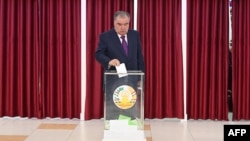Tajikistan, the poorest country in Central Asia and bordering Afghanistan, held parliamentary elections on March 2.
The country has been under the rule of Emomali Rahmon, a former Soviet Union Communist Party official, since 1992.
Rahmon’s party, the People’s Democratic Party of Tajikistan, claimed victory in the elections, securing 49 of the 63 parliamentary seats.
The election was marred by a significant lack of international oversight, with Western observers effectively barred from monitoring the vote.
The Shanghai Cooperation Organization, a regional group led by China and Russia, declared the elections “transparent, credible, and democratic,” with Beijing echoing the same sentiments, praising the election as democratic, open, transparent, and inclusive.
However, these claims are false and do not align with the reality on the ground.
Lack of political competition
Tajikistan’s elections offered no real political competition. All six parties that participated are aligned with Rahmon.
Over the past three decades, Rahmon has systematically eradicated political opposition, creating a state-run political landscape dominated by his supporters. His government has also cultivated a strong personality cult around him, effectively stifling any dissent.
Freedom House, a prominent human rights watchdog, ranks the Tajik government as one of the most authoritarian regimes in the world.
Rahmon's son, Rustam Emomali, chairs the upper house of parliament, and analysts predict that this sets the stage for a dynastic succession, further entrenching the regime's power.
The Norwegian Helsinki Committee, based in Oslo, describes Tajikistan’s parliament as a "rubber-stamp body," devoid of any real legislative authority.
Since the government banned the Islamic Renaissance Party of Tajikistan in 2015, the country's political opposition has been decimated. The Social Democratic Party (SDP), another opposition group, has failed to secure any parliamentary seats since its formation in 2002, and its leaders have faced persecution.
Repression of opposition and media
After the death of SDP leader Rakhmatillo Zoiirov in May 2024, his deputy Shokirjon Khakimov and several other politicians were detained on charges of plotting to overthrow the government.
Khakimov was sentenced to 18 years in prison in February, with seven other alleged conspirators receiving sentences of up to 28 years.
Khakimov’s niece, journalist Ruhshona Khakimova, was also sentenced to 18 years in prison under secretive circumstances, with the charges against her remaining undisclosed.
Voice of America’s sister organization, Radio Free Europe/Radio Liberty (RFE/RL), reported in February that the Tajik government has been arresting and imprisoning anyone perceived as a threat to its rule for nearly a decade. Many of these individuals are convicted in closed trials, with their cases treated as state secrets, making it impossible for the public to know what evidence was used against them.
Election oversight: Lack of transparency
The government ensured the election results could not be independently verified.
For the first time since 2000, the Organization for Security and Cooperation in Europe (OSCE) canceled its monitoring mission, citing concerns over the lack of assurance that international observers would be accredited.
OSCE also pointed out the absence of non-partisan citizen observation, as well as the general lack of civil society organizations capable of independently assessing Tajikistan’s democratic processes.
Steve Swerdlow, a human rights expert focused on Central Asia, told RFE/RL's Kyrgyz Service, locally known as Radio Azattyk, that the absence of OSCE observers was an unprecedented move that signaled increasing authoritarianism and a shift toward a more “despotic” regime under Rahmon.
Additionally, the Tajik government banned Radio Ozodi, the Tajik-language service of RFE/RL, from covering the elections.
Reporters Without Borders (RSF) named Radio Ozodi the last remaining independent media outlet in Tajikistan, and their increasing persecution underscores the dire media environment. RSF ranked Tajikistan 155th out of 180 countries in its 2024 World Press Freedom Index.
Despite these restrictions, some regional media outlets reported irregularities suggesting potential voter fraud. Azda TV, citing anonymous witnesses, reported that sick individuals were coerced into voting for the ruling party. Another witness claimed to have seen a person bringing in a stack of passports to vote on behalf of others.
Conclusion: A flawed election
The absence of independent media or monitors left Tajikistan's election results unverified. Rahmon’s sustained crackdown on political opposition, media freedoms, and civil liberties undermines the possibility of holding free, fair, and transparent elections. Given these conditions, the legitimacy of the election remains highly questionable.





